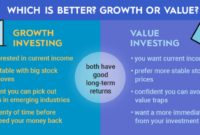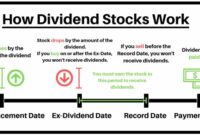Dividend stocks vs REITs – Dividend stocks and REITs stand as two prominent income-generating investment options, each boasting unique characteristics and potential rewards. As we delve into the Dividend Stocks vs. REITs debate, we’ll uncover their distinct advantages, risks, and strategies, empowering you to make informed decisions that align with your financial goals.
In this comprehensive guide, we’ll dissect the key differences between dividend stocks and REITs, analyze their income potential, explore tax implications, assess risk and volatility, and provide tailored investment strategies. Whether you’re a seasoned investor or just starting your journey, this exploration will equip you with the knowledge and insights to navigate the Dividend Stocks vs. REITs landscape with confidence.
Definition and Overview

Dividend stocks and REITs are two popular income-generating investments. Dividend stocks are shares of companies that pay a portion of their profits to shareholders in the form of dividends. REITs, or real estate investment trusts, are companies that own and operate real estate properties and distribute income to shareholders.
Dividend stocks offer a steady stream of income, making them attractive for those planning for early retirement. However, it’s important to consider alternative investment options such as REITs, which provide diversification and the potential for capital appreciation.
While REITs can be a valuable part of a diversified portfolio, dividend stocks remain a cornerstone for investors seeking income and capital growth, especially for those nearing retirement.
Dividend stocks for early retirement can provide a passive income stream, reducing the need to rely solely on savings and Social Security.
Examples of dividend stocks include companies like Coca-Cola (KO), Johnson & Johnson (JNJ), and Procter & Gamble (PG). Examples of REITs include companies like Prologis (PLD), Crown Castle (CCI), and American Tower (AMT).
The key difference between dividend stocks and REITs is that REITs are required to distribute at least 90% of their taxable income to shareholders, while dividend stocks are not.
Income Potential, Dividend stocks vs REITs
Dividend stocks and REITs both have the potential to generate income for investors. Dividend yields, which represent the annual dividend per share divided by the current stock price, can vary significantly depending on the company and the current market environment.
Dividend stocks and REITs offer investors steady income streams, but their growth potential may be limited. To diversify a growth stock portfolio, consider incorporating companies with high earnings growth rates and strong competitive advantages.
Growth stock portfolio diversification can enhance overall portfolio returns and mitigate risks associated with dividend stocks and REITs.
REITs typically have higher dividend yields than dividend stocks, but this is because they are required to distribute more of their income to shareholders. REIT dividends are also more likely to be stable and predictable, as they are derived from rental income and other real estate-related activities.
Tax Implications
Dividend income and REIT distributions are taxed differently. Dividend income is taxed at the same rate as ordinary income, while REIT distributions are taxed as capital gains. This can make REITs more tax-efficient for investors in higher tax brackets.
However, it is important to note that REITs are subject to the unrelated business income tax (UBIT), which can apply to income that is not derived from real estate-related activities. This can make REITs less tax-efficient for investors who are not in the real estate business.
Risk and Volatility
Dividend stocks and REITs have different risk and volatility profiles. Dividend stocks are generally considered to be less risky than REITs, as they are less sensitive to changes in the real estate market.
However, dividend stocks can still be subject to market volatility, and dividend payments can be cut or suspended if the company’s financial performance deteriorates.
REITs are more sensitive to changes in the real estate market, and their values can fluctuate more than dividend stocks. However, REITs can also provide diversification benefits, as they are not directly correlated to the stock market.
Investment Strategies
There are a variety of investment strategies that can be used to generate income from dividend stocks and REITs. One common strategy is to invest in a diversified portfolio of dividend stocks with a history of paying consistent dividends.
Another strategy is to invest in REITs that are focused on a specific property type or geographic region.
When investing in dividend stocks, it is important to consider the company’s financial health, dividend history, and industry outlook. When investing in REITs, it is important to consider the company’s portfolio of properties, management team, and financial leverage.
Recent Trends and Market Outlook
In recent years, dividend stocks and REITs have both performed well. Dividend stocks have benefited from low interest rates and a growing economy. REITs have benefited from rising real estate values and a strong demand for rental properties.
Dividend stocks and REITs provide investors with income streams, but growth stocks offer the potential for capital appreciation. For those seeking higher returns, top performing growth stocks have consistently outpaced the market.
However, it’s important to note that dividend stocks and REITs provide diversification and income stability, making them suitable for a balanced portfolio.
The outlook for dividend stocks and REITs is positive. However, investors should be aware of the risks involved in both types of investments. Dividend stocks can be subject to market volatility, and REITs can be sensitive to changes in the real estate market.
Concluding Remarks: Dividend Stocks Vs REITs
Dividend stocks and REITs offer compelling opportunities for income generation, but their suitability depends on individual circumstances and investment objectives. Dividend stocks provide a steady stream of income and potential for long-term growth, while REITs offer higher yields but come with inherent real estate market risks.
By understanding the nuances of each investment type, investors can craft a diversified portfolio that aligns with their risk tolerance and income goals.
As the market landscape evolves, staying informed about the latest trends and market outlook for Dividend Stocks vs. REITs is crucial. By keeping abreast of industry developments and economic indicators, investors can make informed adjustments to their strategies, ensuring they remain well-positioned to capitalize on potential opportunities and mitigate risks.
Question Bank
What is the primary difference between dividend stocks and REITs?
Dividend stocks represent ownership in companies that distribute a portion of their profits to shareholders, while REITs are companies that invest in and manage real estate properties, distributing income from rental income and property appreciation.
Which investment type offers higher income potential?
REITs typically offer higher dividend yields compared to dividend stocks, but this higher income potential comes with increased risk associated with the real estate market.
How are dividend income and REIT distributions taxed?
Dividend income is taxed as ordinary income, while REIT distributions are taxed as either ordinary income or capital gains, depending on the nature of the distribution.
Which investment type is generally considered less risky?
Dividend stocks are often perceived as less risky than REITs due to their diversification across different industries and sectors.




